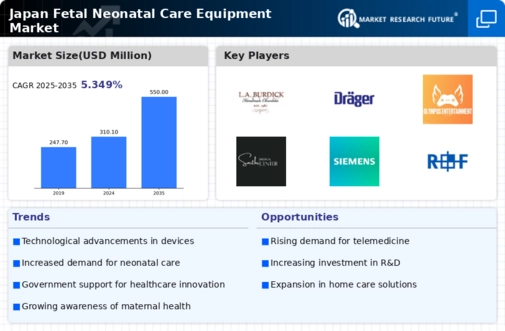Rising Birth Rates
The fetal neonatal-care-equipment market in Japan is experiencing growth due to rising birth rates. Recent statistics indicate that the birth rate in Japan has shown signs of stabilization, with a slight increase observed in recent years. This trend is likely to drive demand for advanced neonatal care equipment, as healthcare facilities prepare to accommodate more newborns. Hospitals and clinics are investing in state-of-the-art technologies to ensure the health and safety of infants, which may lead to an increase in the adoption of fetal monitoring systems and incubators. The growing awareness of neonatal care's importance among parents and healthcare providers further supports this trend, suggesting a robust future for the fetal neonatal-care-equipment market in Japan.
Government Initiatives and Funding
Government initiatives aimed at improving maternal and child health are playing a pivotal role in the fetal neonatal-care-equipment market. The Japanese government has been actively promoting policies that support maternal health, which includes funding for healthcare facilities to upgrade their neonatal care equipment. This financial support is crucial for hospitals, especially in rural areas, where access to advanced medical technology may be limited. As a result, the fetal neonatal-care-equipment market is expected to benefit from increased investments in healthcare infrastructure, leading to enhanced care for newborns and a potential rise in market demand.
Growing Awareness of Neonatal Health
There is a growing awareness of neonatal health issues among the Japanese population, which is influencing the fetal neonatal-care-equipment market. Parents are becoming more informed about the importance of early detection and treatment of neonatal conditions. This heightened awareness is driving demand for advanced fetal monitoring devices and neonatal care equipment. Healthcare providers are responding by offering more comprehensive services and investing in the latest technologies to meet these expectations. As awareness continues to rise, the fetal neonatal-care-equipment market is likely to see sustained growth, reflecting the increasing prioritization of neonatal health in Japan.
Aging Population and Healthcare Demand
Japan's aging population is contributing to an increased demand for healthcare services, including those related to neonatal care. As the demographic landscape shifts, there is a growing need for specialized equipment to cater to both newborns and their mothers. The fetal neonatal-care-equipment market is likely to benefit from this trend, as healthcare facilities adapt to the changing needs of the population. The demand for high-quality neonatal care is expected to rise, prompting hospitals to invest in advanced equipment and technologies. This shift may lead to a more robust market environment, as providers seek to enhance their offerings in response to the evolving healthcare landscape.
Technological Integration in Healthcare
The integration of advanced technologies into healthcare systems is a significant driver for the fetal neonatal-care-equipment market. Innovations such as telemedicine, artificial intelligence, and data analytics are being increasingly utilized in neonatal care. These technologies enhance monitoring capabilities and improve patient outcomes, which is crucial in a country like Japan, where healthcare quality is paramount. Hospitals are adopting these technologies to streamline operations and provide better care for newborns. The market for fetal neonatal-care-equipment is likely to expand as healthcare providers seek to implement these advanced solutions, potentially leading to a more efficient and effective neonatal care environment.





















Leave a Comment